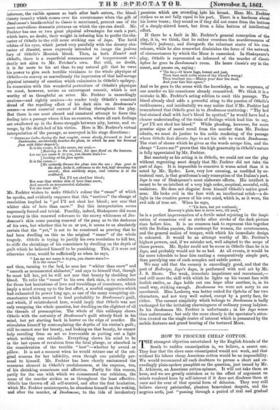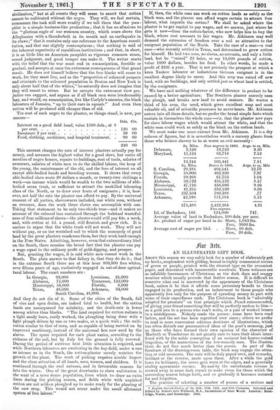HOW TO PROCURE CHEAP COTTON.
rustrongest objection entertained by the English friends of the South to sudden emancipation is, we believe, a secret one. They fear that the slave once emancipated would not work, and that without his labour cheap American cotton would be an impossibility. We would recommend all such doubters to peruse a short and ex- ceedingly plain-spoken pamphlet on the question, just issued by Mr. B. Atkinson, an American cotton-spinner. It will not take them an hour, and we are greatly mistaken as to the effect of argument on minds rendered keen by self-interest if it does not disabuse them at once and for ever of that special form of delusion. They may still believe slavery patriarchal, planters benevolent despots, and the negroes serfs, just "passing through a period of real and gradual civilization," but at all events they will cease to assert that cotton cannot be cultivated without the negro. They will, we feel certain, commence the task still more readily if we tell them that the pain- phlet is a simple business-like production ; that it has no allusions to the "glorious eagle of our common country, which soars above the Alleghanies with a thunderbolt in its mouth and an earthquake in its claws ;" that it contains only one reference to the American consti- tution, and that one slightly contemptuous ; that nothing is said of the inherent superiority of republican institutions ; and that, in short, it is as little like an American pamphlet as vigorous common sense, sound judgment, and good temper can make it. The writer starts with the belief that the war must end in emancipation, forcible or gradual, and accepts at once the extremest consequences of that grand result. He does not himself believe that the free blacks will cease to work, for they must live, and as the "proportion of coloured paupers and criminals to the coloured population in Boston and New York is only about half that of the whites," he naturally does not imagine that they will resort to crime. But he accepts the extremest view pre- judice can suggest, and argues as if all black men were irredeemably lazy, and would, on emancipation, live like Carlyle's enemies, the black labourers of Jamaica, "up to their ears in squash." And even then cotton will be produced still cheaper than of old.
The cost of each negro to the planter, as things stand, is now, per 81111llin-
Interest on a good field hand, value 1500 dols., at 8
Dols. Cts.
per cent. 120 00 Insurance 2 per cent. 30 00 Food, clothing, medicines, and hospital treatment. . 90 00
240 00
This account charges the rate of interest planters actually pay for money, and assumes the highest value for a good slave, but omits all mention of negro houses, repairs to buildings, cost of tools, salaries of overseers, salaries of white men to do the skilled labour, the keep of the young, the maintenance of the old, and the loss of interest on all except able-bodied hands and breeding women. It shows that every able-bodied slave costs 20 dollars a month, or twenty-two shillings a week-an income which would be wealth to the two millions of able- bodied mean trash, or sufficient to attract the unskilled labouring class of the North, or to draw over hosts of emigrants ; it is, how- ever, not half the rate the planter can afford to pay. By the universal consent of all parties, slaveowners included, one white man, without an overseer, does the work three slaves can accomplish with one. Taking that statement to be only two-thirds true-and it makes no account of the colossal loss sustained through the habitual wasteful- ness of four millions of slaves-the planter could still pay 44s. a week, and, with cotton at 5d. a pound, still flourish and grow rich. It is useless to argue that the white trash will not work. They will not without pay, or on the wretched soil to which the monopoly of good land by' the great planters condemns them, but they work hard enough in the Free States. Admitting, however, even that extraordinary libel on the South, there remains the broad fact that the planter can pay a wage equal to the ordinary profit of gold-digging, and prosper.
But, granting the wages, it is said white men cannot work in the South. The plain answer to that fallacy is, that they do do it ; that in the extreme South there are at this hour 800,000 free whites, over fifteen years of age, exclusively engaged in out-of-door agricul- tural labour. The exact numbers are : In Georgia, 93,000 Louisiana, 25,000 Alabama, 75,000 Tennessee, 132,000 Mississippi, 56,000 Florida, 8,000 Texas, 48,000 Arkansas, 34,000 South Carolina, 48,000.
And they do not die of it. Some of the cities of the South, full of vice and open drains, are indeed fatal to health, but the cotton lands are unsurpassed for salubrity, and the death-rate is lower among whites than blacks. "The land required for cotton culture is a light sandy loam, easily worked, the ploughing being done with a light plough driven by one or two mules, at a quick walk; the culti- vation similar to that of corn, and as capable of being carried on by improved machinery, instead of the universal hoe now used by the slaves. The space required for each plant varies, according to the richness of the soil, but by July 1st the ground is fully covered. During the period of extreme heat little attention is required, and while Northern labourers are sweltering in the hay-field, under a sun as intense as in the South, the cotton-planter merely watches the growth of the plant. The work of picking requires nimble fingers and the close attention of all hands, men, women, and children. It is continued through the cool autumn, and in favourable seasons far into the winter. One of the great drawbacks to slave cultivation is the want of a more dense population, from which to draw an extra force during the picking season, and fields white with unpicked cotton are not seldom ploughed up to make ready for the planting of the new crop. This would not occur under the small allotment system of free labour."
If, then, the white man can work on cotton lands as safely as the black man, and the planter can afford wages certain to attract free labour, what imperils the cotton? We shall be asked where the planter is to get capital to pay wages, and we answer, just where he gets it now-from the cotton-factor, who now helps him to buy the black, whose cost amounts to fair wages. Mr. Atkinson may well demand the extension of freedom over a soil so attractive to the emigrant population of the North. Take the case of a man-a real case-who recently settled in Texas, and determined to grow cotton for himself. He had two sons, no slaves, no servants, and only a little land, but he "raised" 22 bales, or say 10,000 pounds of cotton, value 1000 dollars, besides his food. In other words, he made a profit of 2501. a year. That is not precisely the prospect at which a keen Yankee labourer or industrious German emigrant is in the smallest degree likely to sneer. And this crop was raised off new land, with no buildings, and only settled just as wheat land is settled, by the emigrants.
We have said nothing whatever of the difference in product to be caused by a better agriculture. The Southern planter scarcely uses the plough, and breaks new land to avoid manure. He wastes a third of his crop, the seed, which gives excellent soap and most valuable oil, and of scientific processes he never hears. Mr. Atkinson enters into all these details, butwe prefer the broad simple facts which contain in themselves the whole case-viz. that the planter now pays for slave labour wages which would attract the white, and that the white man could work as safely as the black on the cotton lands.
We must make one more extract from Mr. Atkinson. It is a dry column of figures, but it is nevertheless worth a cursory glance from those who believe slavery to be at worst an evil necessity :
Sq. Miles. Free negroes in 1860. Avge, to sq. Mts.
Delaware, 2,120 19,723 9.30 Maryland, 11,124 83,718 7.52
13,244 103,441 7.81
Sq. Miles. Slaves in 1860. Avge. to sq. Mile
S. Carolina, Georgia, 29,385 58,000 402,541 462,230 13.70 7.97 Florida, 59,268 61,753 1.04 Alabama, 50,722 435,132 8.57 Mississippi, 47,156 436,696 9.26 Louisiana, 41,255 332,520 8.06 Texas, 237,504 180,388 .77 Arkansas, 52,198 111,104 5.13
575,488 2,422,364 4.21
Free negroes.
Isl. of Barbadoes, 166 124,000 747.
Average value of land in Barbadoes, 500 dols. per acre. Av. product of sugar per hand in do. Slave, 1,043 lbs. Free, 3660 lbs.
Average cost of sugar per hhd. . . Slave, 50 dols. Free, 20 dots.































 Previous page
Previous page